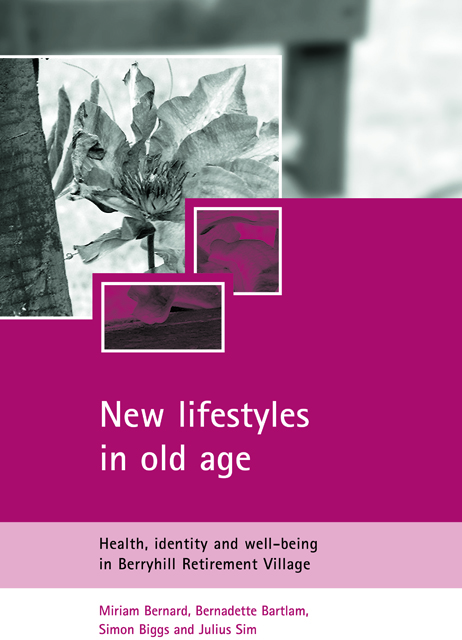Book contents
- Frontmatter
- Contents
- List of tables and figures
- Acknowledgements
- A day in the life of a retirement community resident
- 1 Retirement communities: the context
- 2 Developing a retirement community lifestyle: participation and involvement
- 3 Health and well-being
- 4 Growing older: age and identity
- 5 Conclusions
- References
- Appendix A Research questions
- Appendix B The study’s timeline
- Appendix C Questionnaires
- Appendix D Interviews
- Appendix E Participation groups and community conferencing
4 - Growing older: age and identity
Published online by Cambridge University Press: 06 April 2023
- Frontmatter
- Contents
- List of tables and figures
- Acknowledgements
- A day in the life of a retirement community resident
- 1 Retirement communities: the context
- 2 Developing a retirement community lifestyle: participation and involvement
- 3 Health and well-being
- 4 Growing older: age and identity
- 5 Conclusions
- References
- Appendix A Research questions
- Appendix B The study’s timeline
- Appendix C Questionnaires
- Appendix D Interviews
- Appendix E Participation groups and community conferencing
Summary
Introduction
Retirement villages like Berryhill are distinctive places in which to live. This is reflected in the fact that everyone who lives there has to be over the age of 55. Although there is no upper age limit, such communities are defined largely by age and age differences with respect to other groups. They can also be contrasted with negative aspects of life in local neighbourhoods, particularly where these are seen as threatening or dangerous environments for older people to live in. They are also distinguished from residential and nursing home environments where independence is perceived to be under threat and ‘old fashioned’ notions of dependency and decline are still seen to hold sway (Biggs et al, 1999). By contrast, retirement communities are intended, in theory at least, to take the best from both worlds and to be environments that enhance both security and autonomy for older people.
What, therefore, is it actually like to live and grow older in such a new environment? Drawing on qualitative and quantitative data from various phases of the study, this chapter considers this question by exploring:
• understanding age and identity;
• experiences of age and identity;
• intergenerational relationships;
• perceptions of others;
• reasons for living in Berryhill retirement village.
The chapter concludes with a look at some of the challenges facing such communities: challenges that are developed further in the final chapter of this report.
Understanding age and identity
We think we know what age is: it is the time passed, in years, between birth and how old one is now. But age can also be something that is felt, experienced and is reflected in appearances. How one thinks about one’s age can depend on a variety of factors, such as the environment one lives in, perceived health status and the attitudes of other people (Moody, 1986). Each affects how age is perceived and how it is responded to. In other words, the effects of chronological age depend on identity: how individuals think and feel about themselves and their own ageing.
- Type
- Chapter
- Information
- New Lifestyles in Old AgeHealth, Identity and Well-being in Berryhill Retirement Village, pp. 37 - 49Publisher: Bristol University PressPrint publication year: 2004



